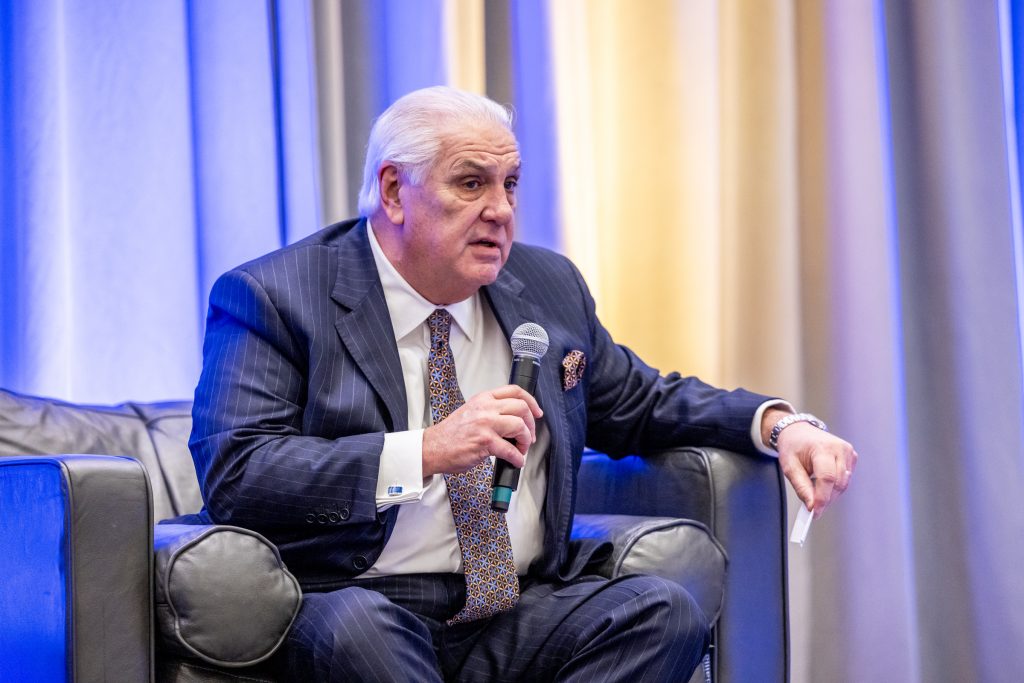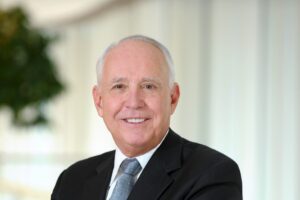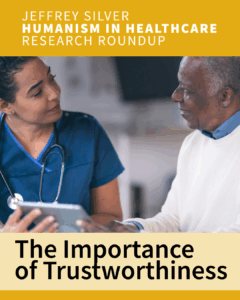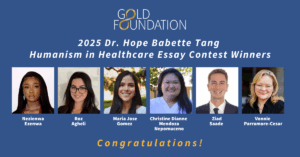At the 2024 Gold Humanism Summit, Dr. Pedro “Joe” Greer Jr. discusses how virtues can improve medical education and the care of patients
Gold Trustee Dr. Pedro “Joe” Greer Jr. can lead a masterclass on the transformation possible in medical education. He did just that at the 2024 Gold Humanism Summit, the annual conference of The Arnold P. Gold Foundation, held February 29–March 2 in Atlanta.

Gold Trustee Dr. Pedro “Joe” Greer Jr. speaks at the 2024 Gold Humanism Summit
Dr. Greer was joined by Gold Foundation President and CEO Dr. Kathleen Reeves for the Goldman Plenary, “A Conversation Between Kathy & Joe: Where is Humanism in Medical Education?”
Dr. Reeves began the session by emphasizing medical education’s critical role in creating the doctors of tomorrow while addressing the many challenges facing medicine today. The possibility of change — “a chance to do it over,” noted Dr. Reeves — framed the conversation.
Dr. Greer, who is starting a medical school from the ground up at Roseman University, has that unique opportunity for a “do over” that will affect generations of clinicians to come.
There are many measures of a successful medical education system in the United States.
For some, the measure is patents. For others, it’s grant funding. And for others still, it may be a huge clinic. Dr. Greer’s answer: a healthy country.
Starting from scratch
Dr. Greer isn’t afraid to reinvent traditions in medical education.

Dr. Greer was joined by Gold Foundation President and CEO Dr. Kathleen Reeves.
As the Founding Dean of the Roseman University College of Medicine in Las Vegas, Nevada, he looked closely at the system’s faults and started anew.
Initially, there was skepticism around building a medical school in a desert filled with casinos and resorts. But his goal at Roseman was clear.
He wanted to establish a 21st century medical school that prioritized innovation, diversity, and compassion.
So, Dr. Greer brought students, educators, and the community together to design a premier institution for collaboration in education, healthcare, and research.
As stated on its official website, Roseman would serve as a way to “unite the heart and science of healthcare,” which it considers the two halves of its mission.
A curriculum of the community
At Roseman, diversity is a strength, and this includes diversity of thought.
During the session, Dr. Greer referenced Roseman’s work with Dr. Stowe Shoemaker.
Dr. Shoemaker is a veteran hospitality academic and the former dean of the University of Nevada, Las Vegas’s William F. Harrah College of Hospitality.
He co-authored Hospitable Healthcare: Just What the Patient Ordered!, which offers a rich exploration of how healthcare can benefit from adopting hospitality principles in its efforts to improve the patient experience.
Dr. Shoemaker started the book by saying that in the world of hospitality and business, the client is most important. In the world of healthcare, it’s the doctor. But it should be the patient.
Dr. Greer shares that same belief.
In founding Roseman’s College of Medicine, he is fostering a “community-dependent” model of education that prioritizes collaboration and partnership with one of America’s most diverse and dynamic communities.
A new portrait of leadership
Dr. Greer was one of the early proponents of training physicians in the social determinants of health.
Before joining Roseman, Dr. Greer served as Professor of Medicine, Founding Chair of the Department of Humanities, Health, and Society, and Associate Dean for Community Engagement at Florida International University’s Herbert Wertheim College of Medicine (FIU HWCOM) in Miami, Florida.
He collaborated with various FIU colleges to create the Green Family Foundation Neighborhood Health Education Learning Program (NeighborhoodHELP).
The nationally recognized program prepares medical and other health professions students to address social determinants of health as they care for underserved households in Miami-Dade County, Florida.
He is a visionary who paves the way forward, even when others doubt the unprecedented journey ahead.
Roseman is just one of many examples throughout Dr. Greer’s career where he sought to address a critical gap in medical education.
Dr. Greer recognized that medicine in America was in trouble. Medical outcomes were dire as a result of unequal access to quality healthcare services. Patients could not see themselves in their doctors due to a lack of diversity.
At Roseman College of Medicine, the six senior deans, including Dr. Greer, are diverse in many ways: gender, race, and ethnicity. They are also diverse in their educational backgrounds — only two deans have medical degrees. Their specialties include community development, finance, bioethics, and philosophy.
As Dr. Greer explained, qualitative research is a critical component that he looks for when hiring new faculty.
“I want researchers that are trying to understand society,” he noted.
Virtues leading the way
Dr. Greer is a recipient of the Presidential Medal of Freedom and the MacArthur Foundation “Genius Grant” Fellowship. In his celebrated medical career, he has advised former presidents and their administrations.
His leadership is virtues driven.
He founded the Camillus Health Concern in Miami in 1985 to provide food, shelter and medical care for the homeless.
Dr. Greer also established St. John Bosco Clinic and other clinics in the Homestead area, which became critical resources following Hurricane Andrew. St. John Bosco Clinic has provided medical services to more than 35,000 undocumented residents of Miami-Dade County who don’t have access to primary healthcare.
Virtues will also be an essential, defining feature of Roseman College of Medicine’s future curriculum.
“I want the virtues placed and measured at every single level from the foundational sciences to the clinical sciences,” Dr. Greer said.
He understands fundamentally that tomorrow’s physicians will be future leaders in medicine. Therefore, they must be trained effectively — that is, they cannot only be trained in intellectual facts.
“Intellect is not solving the problem. Look at our health outcomes. Intellect with the proper virtues will drive you to find the right answer to help those that need it the most,” Dr. Greer emphasized.
In her closing remarks, Dr. Reeves addressed the impact of Dr. Greer’s lifetime of service to medicine and underserved communities.
“You are the example of hope. For you to be creating and running a medical school, to me, means there is real hope.”
To learn about Dr. Greer’s inspirations, thoughts on humanism in healthcare, his favorite feel-good song and much more, read his interview in the “8 Questions with ….” Series, which spotlights members of the Gold community.


